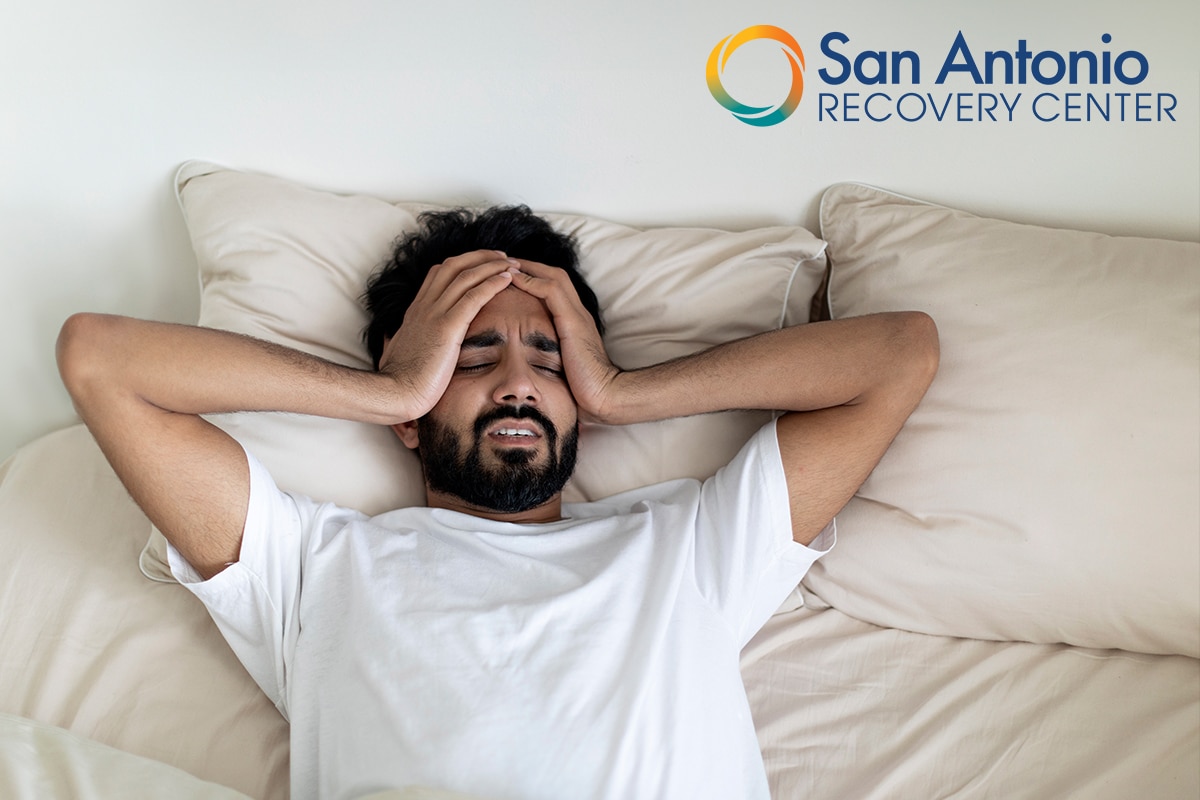
You wake up freezing cold with your pajamas clinging to your skin. What’s going on? As you step out of bed, you realize your sheets are damp, too. The only explanation is that you’ve been sweating in your sleep again. These night sweats have been happening more lately, and sure, you’ve been drinking more lately too, but are they really related?
The answer is yes. Night sweats from alcohol are a real thing, and are especially common in individuals who drink excessively. Despite nearly half of Texans thinking binge drinking is risky, San Antonio’s nightlife is still bustling and active. While most people believe they can return home after a night of partying and sleep off any of alcohol’s effects, that becomes significantly more difficult when night sweats impact your ability to sleep comfortably. Many health conditions can cause night sweats, including alcohol use disorder. Let’s explore the relationship between alcohol and night sweats, and what to do if you have them.
Night sweats are pretty straightforward: it simply means you sweat in your sleep. Some additional symptoms come with night sweats, though. If you have some of these, you can confirm you’re experiencing night sweats:
It’s important to note that night sweats aren’t always from alcohol. Fevers, hot flashes, low blood sugar, medications, endocrine problems, and pregnancy can also cause night sweats. However, if you’ve been drinking, especially if it’s a significant amount of alcohol, your night sweats could be related to your drinking habits.

Alcohol increases your heart rate and blood pressure, which widens your blood vessels. These factors combined increase body temperature, and the body’s natural response to a higher body temperature and flushed skin is sweating. It’s important to note that alcohol can cause sweating at any time of day. Night sweats are only more common because people tend to drink alcohol more at night.
Night sweats and alcohol’s diuretic nature lead to the body losing a lot of fluids, putting anyone drinking excessively at a greater risk of dehydration.
People can experience night sweats from drinking alcohol at any point, but alcohol-related night sweats are most common in those experiencing alcohol withdrawal, and those with alcohol intolerance.
Alcohol withdrawal symptoms can start as early as a few hours after your last drink, to a few days after it. How you experience withdrawal will be different than how anyone else does, and depends on how much you drank, how long you’ve been drinking a lot of alcohol, and your body’s condition.
If you’re experiencing withdrawal symptoms, with night sweats included, this indicates your body is dependent on alcohol. Withdrawal symptoms will usually go away once you drink again, but this can lead to a vicious cycle of drinking and withdrawal that indicates a potential alcohol use disorder.
There are some common symptoms of alcohol withdrawal to look out for. While these symptoms can come with other conditions, if you experience any of these after you drink alcohol, you may be experiencing alcohol withdrawal:
While these withdrawal symptoms are typically not dangerous in themselves, experiencing them does indicate a potential alcohol use disorder, which can negatively impact your health and life. Seeking treatment would be a good idea.
Some withdrawal symptoms are more severe. If you experience any of the following, seek medical attention:
The most serious form of withdrawal is known as Delirium Tremens (DT). While rare, DTs can be life-threatening and require immediate medical attention. Signs of Delirium Tremens include:
DTs typically begin 24 to 48 hours after your last drink, but symptoms can worsen quickly, so it’s important to take action as soon as you notice any severe withdrawal symptoms.
Sometimes, night sweats aren’t related to withdrawal or a hangover. Instead, they’re brought on by even the smallest amount of alcohol, and they can come on immediately. This condition is called alcohol intolerance, and happens due to a genetic inability to break down alcohol. The body lacks a key enzyme involved in the process.
A tell-tale symptom of alcohol intolerance is facial flushing, and with flushing can come sweating. Other symptoms of alcohol tolerance include:
Alcohol intolerance isn’t technically an allergy in itself, but sometimes these symptoms can be a sign of an allergy to something in alcohol, as opposed to alcohol intolerance.
Alcohol intolerance is very different from an alcohol use disorder or alcohol dependence. Often, people with alcohol intolerance feel ill enough from alcohol that they avoid it altogether.
Alcohol-related night sweats are uncomfortable and can interfere with sleep, which is important to functioning during the day. No matter why you’re having night sweats, the following may make them more manageable:
If your night sweats are specifically related to alcohol, the best thing to do is cut down on your alcohol consumption. If you’re experiencing night sweats due to withdrawal symptoms, however, it will be safest to consult with a doctor before stopping drinking altogether. If your doctor believes your night sweats are due to an alcohol use disorder, they may recommend alcoholism treatment.

Even if you determine your night sweats from alcohol are likely due to alcohol withdrawal, it may be difficult to accept you could have an alcohol use disorder. There are additional signs of an alcohol use disorder you should consider:
If you experience night sweats from alcohol and any of these additional symptoms, you likely have an alcohol use disorder. There’s no better time to seek treatment than now.
The first step of alcohol rehab will be a detox program, where you will be closely monitored by medical professionals throughout your detox process to ensure it goes safely and smoothly. After that, you will progress to different methods of treatment to help you recover from alcohol use disorder.
San Antonio Recovery Center is a facility dedicated to treating substance use disorders and underlying mental health conditions. At our treatment center, every patient is valued as an individual. With our low patient-to-therapist ratio, we ensure everyone receives quality care customized to them and their needs. Give us a call at 866-957-7885, and start your recovery journey today.
When should I be worried about night sweats?
Night sweats typically aren’t dangerous, but if you frequently have them after drinking alcohol, you may have alcohol intolerance or be experiencing alcohol withdrawal. Alcohol withdrawal can be a sign of alcohol use disorder, and warrant looking into treatment for the condition. If your night sweats are persistent and unrelated to alcohol, you may have a different medical condition. In general, if night sweats are interfering with your life, you should consult with your doctor.
contact us now!
